
Giosuè Alessandro Giuseppe Carducci was an Italian poet, writer, literary critic and teacher. He was noticeably influential, and was regarded as the official national poet of modern Italy. In 1906, he became the first Italian to receive the Nobel Prize in Literature. The Swedish Academy's motivation was that "not only in consideration of his deep learning and critical research, but above all as a tribute to the creative energy, freshness of style, and lyrical force which characterize his poetic masterpieces."

Vincenzo da Filicaja was an italian poet and politician, citizen of Grand Duchy of Tuscany. His poetry was compared to that of Petrarch, and his association with the Accademia della Crusca gave him access to royal patronage. He served as governor of Volterra and Pisa, successively, and finally in the Tuscan Senate.
An epithalamium is a poem written specifically for the bride on the way to her marital chamber. This form continued in popularity through the history of the classical world; the Roman poet Catullus wrote a famous epithalamium, which was translated from or at least inspired by a now-lost work of Sappho. According to Origen, the Song of Songs might be an epithalamium on the marriage of Solomon with Pharaoh's daughter.

Johann Peter Eckermann, German poet and author, is best known for his work Conversations with Goethe, the fruit of his association with Johann Wolfgang von Goethe during the last years of Goethe's life.

Brunetto Latini was an Italian philosopher, scholar, notary, politician and statesman.

Sedulius was a Christian poet of the first half of the 5th century.

Francesco Berni was an Italian poet. He is credited for beginning what is now known as "Bernesque poetry", a serio-comedic type of poetry with elements of satire.

Jacopo Mazzoni was an Italian philosopher, a professor in Pisa, and friend of Galileo Galilei. His first name is sometimes reported as "Giacomo".

Count Angelo De Gubernatis, Italian man of letters, was born in Turin and educated there and in Berlin, where he studied philology. He was nominated for the Nobel Prize in Literature fourteen times.

Giovanni Placido Agostino Pascoli was an Italian poet, classical scholar and an emblematic figure of Italian literature in the late nineteenth century. Alongside Gabriele D'Annunzio, he was one of the greatest Italian decadent poets.

Giovanni Marradi (1852–1922) was an Italian poet born at Livorno, Grand Duchy of Tuscany, and educated at Pisa and Florence. At the latter place, he started with others a short-lived review, the Nuovi Goliardi, which made a literary sensation. He became a teacher at various colleges, and eventually an educational inspector in Massa Carrara.
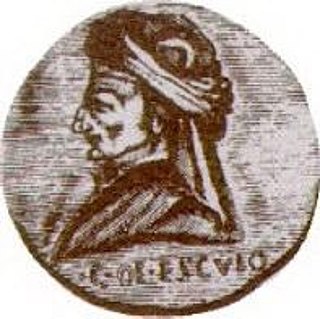
Cecco d'Ascoli is the popular name of Francesco degli Stabili, an Italian encyclopaedist, physician and poet. Cecco is the diminutive of Francesco, Ascoli was the place of his birth. The lunar crater Cichus is named after him.
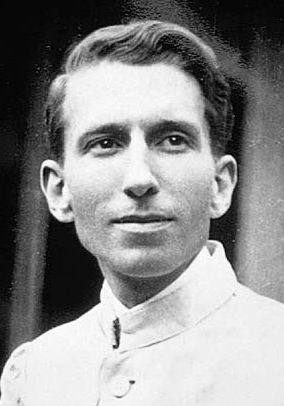
Guido Gustavo Gozzano was an Italian poet and writer.
Giuseppe Antonio Borgese was an Italian writer, journalist, literary critic, Germanist, poet, playwright and academic naturalized American.
Nationality words link to articles with information on the nation's poetry or literature.
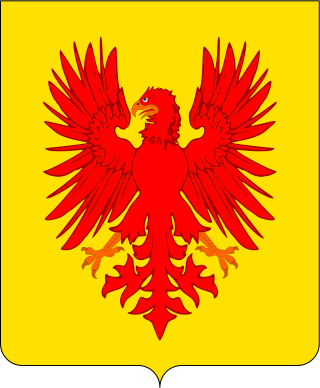
The da Polenta family or Polentani was an old Italian noble family whose name derives from the Castle of Polenta near Bertinoro in Romagna.
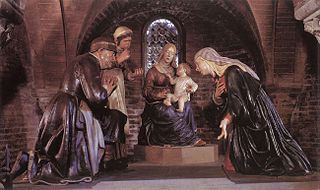
Guido Mazzoni was an Italian Renaissance sculptor, mainly in terracotta, and painter of the Renaissance period, working in Bologna, Naples, and France. He is also sometimes referred to as Il Modanino.
Jacopo Alighieri was an Italian poet, the son of Dante Alighieri, whom he followed in his exile. Jacopo's most famous work is his sixty-chapter Dottrinale. He is represented by his father in the Paradiso of the Divine Comedy as Saint James along with Saint Peter and Saint John the Evangelist, representing his brothers Pietro and Giovanni.
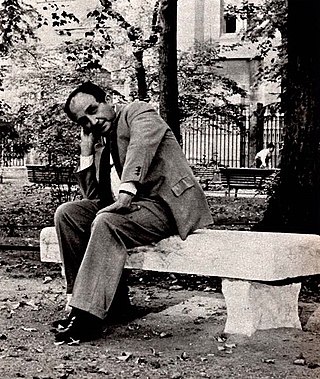
Alfonso Gatto was an Italian writer. Along with Giuseppe Ungaretti he is one of the foremost Italian poets of the 20th century and a major exponent of hermetic poetry.

Antonio Gasparinetti was an Italian poet, playwright and military officer in Napoleon's Armée d'Italie. Born in the Province of Treviso, he joined a light cavalry regiment as a lieutenant in 1797 and rose to the rank of colonel by the end of his career in 1814. He distinguished himself in several major battles of the Napoleonic wars, including the Battle of Wagram when he was awarded the Legion of Honor by Napoleon. After the fall of Napoleon in 1814, he was deeply involved in the Congiura di Brescia-Milano, a plot to overthrow Austrian rule in northern Italy. When the conspiracy was discovered, he was arrested and spent nearly four years in prison. Following his release in 1818 he devoted himself to literary pursuits and collecting military memorabilia. Gasparinetti was married to the opera singer Elisabetta Gafforini from 1812 until his death in Milan at the age of 47.
















